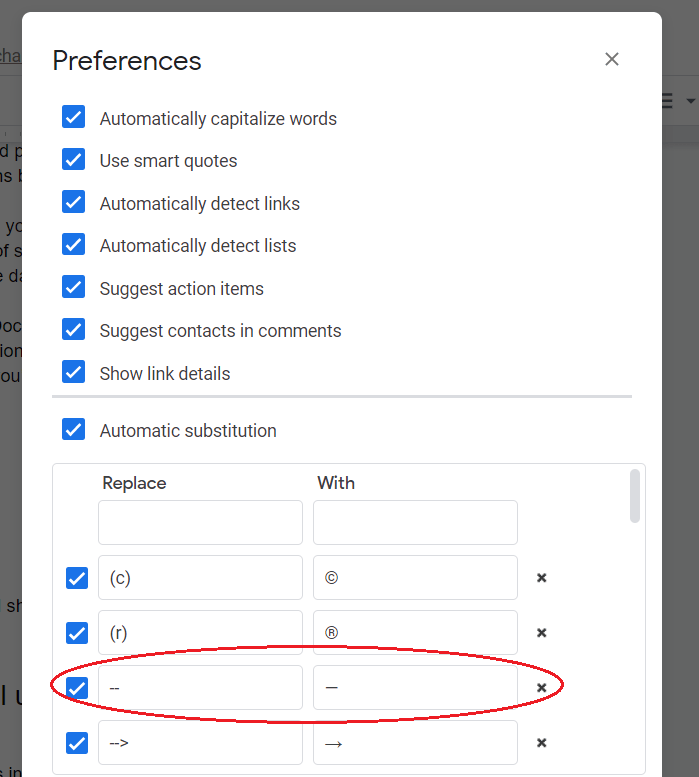Ah, the em dash — that multifaceted, all-purpose punctuation mark that can act as a parenthesis, comma, colon, semicolon or even quotation mark. It’s used in so many manners: to separate clauses that still want to be close friends; to create asides or add emphasis or signal amplification or denote interruption.
With such a wide range of acceptable applications, an em dash might seem easy to use. But despite its flexibility, there’s one way in which the em dash is anything but intuitive — and that’s typographically.
If you want to benefit from the em dash without littering your manuscript with double hyphens (–), here’s what you need to know.
Here’s how to type an em dash in your favorite word processor
No matter where you do your writing, there’s a trick to ensuring you get the perfect em dash every time!
In Google Docs
Although MS Word has long been considered industry standard, many writers have moved on to Google’s free cloud-based word processing platform, Google Docs. However, in this program, dual hyphens stay dual hyphens by default.
In order to put an em dash into your work, navigate to the “Insert” menu, and then select “Special Characters.” Instead of scrolling through the various symbols available to you, you can simply search for “em,” and the dash will come right up.
If you — like me — use Google Docs almost exclusively and love your em dashes, I’d recommend creating an automatic substitution command.
Click on the “Tools” menu, and then click on “Preferences.” At the bottom, you’ll see a tick box next to the words “Automatic substitution.” Ensure it’s toggled on, and then set a command to replace — with — (grab the symbol from the “Special Characters” menu referenced above, and copy/paste it into the right-hand text box).

Ta-da! You never have to go menu hunting for em dashes again.
In MS Word
One of the most popular word processors on the market, MS Word offers users a variety of ways to make an em dash appear.
The first of these is AutoFormat, which is likely already enabled and will automatically create an em dash when you type a double hyphen (–). In order to make AutoFormat change your — to —, you’ll need to type one word before and one word after the double hyphen, without pressing the spacebar until the end.
Example: hocus–pocus (space) becomes hocus—pocus
If AutoFormat is not enabled (and you don’t want it to be), you can also find em dashes by navigating to the Insert tab, selecting Symbol, choosing More Symbols, and clicking the em dash on the second row. Finally, there’s also a keyboard shortcut: Ctrl+Alt+minus, where Num Lock is enabled and you’re utilizing the minus symbol on your numeric keypad.
On a Mac
If you’re operating on a Mac, the basic instructions for MS Word and Google Docs above should still apply — though you’ll have different keyboard shortcuts. In Word, you’ll hold down Shift+ Option+minus rather than the Ctrl+Alt+minus mentioned above.
In the native Mac word processor, Text Edit, you’ll have access to the Emojis & Symbols menu under Edit, which you can browse for the em dash.
Okay…but when do I use an em dash?
If you’re like most of the writers we know, chances are you’re already comfortable employing this enigmatic piece of punctuation— if anything, you use it too much. (Yes, I could cram an em-dash into just about every sentence I write if my editors would allow it. Who says you have to follow grammar rules?!)
Indeed, em dashes are so versatile it’s hard to find examples wherein they’re truly wrong.
But just in case you’re looking for ways to spice up your punctuation, here are a few scenarios in which an em dash is a valid option.
To set off parentheticals
Just as you use parentheses to set aside auxiliary information (like this), you can use em dashes for the same purpose. However, where parentheses cast the information very much as an aside, em dashes have a tendency to emphasize the information — so be sure you choose wisely.
Em dashes are also particularly useful in setting aside appositives that contain commas, since they offer a less cluttered, more streamlined sentence to the reader.
Examples:
- Portland is a city where the weather — by which we mean rain, and a lot of it — can be a detractor for those who are susceptible to seasonal affective disorder.
- Learning to use proper punctuation — including periods, commas, question marks and more—will make you into a much stronger writer.
In place of a semicolon or colon
We’ve already talked about when to use a semicolon and their plain-old-colon cousins. In many cases, an em dash can be subbed in for either of these punctuation marks.
For instance, if you’re separating an independent clause and a list, an em dash is just as valid an option as a colon. An em dash can also separate two independent clauses, just like a semicolon does, though it may feel more casual and signify that the two ideas are quite closely related.
Examples:
- There are a few things you need for a safe hiking trip — sunscreen, water and high-quality footwear.
- We still aren’t sure if the manuscript is going to be accepted — we’re in a rather nail-bitey mood as of late.
To signal interruptions or shifts
When writing narratives or dialogue, em dashes become even more useful; they can help you bring a reader into the scene by displaying interruptions or changes in tone.
Examples:
- “Where are we goi—”
“Shh,” he interrupted her, grinning. “Just trust me on this one, okay?” - First comes love, then comes marriage — then comes the $30,000 bill for the wedding.
So now you’ve got everything you need to put em dashes in your own writing — the when, the where and the how. So what are you waiting for? Get writing!
Photo via Alissa Kumarova / Shutterstock







